上海牛津英语高中考点梳理
上海牛津英语A语法知识点复习
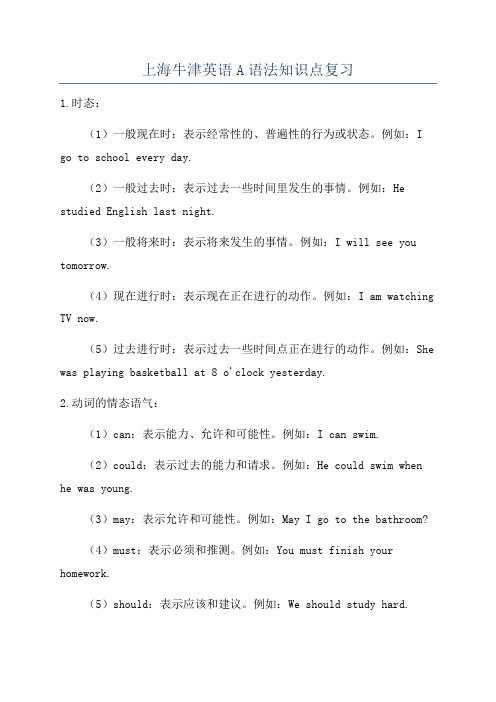
上海牛津英语A语法知识点复习1.时态:(1)一般现在时:表示经常性的、普遍性的行为或状态。
例如:I go to school every day.(2)一般过去时:表示过去一些时间里发生的事情。
例如:He studied English last night.(3)一般将来时:表示将来发生的事情。
例如:I will see you tomorrow.(4)现在进行时:表示现在正在进行的动作。
例如:I am watching TV now.(5)过去进行时:表示过去一些时间点正在进行的动作。
例如:She was playing basketball at 8 o'clock yesterday.2.动词的情态语气:(1)can:表示能力、允许和可能性。
例如:I can swim.(2)could:表示过去的能力和请求。
例如:He could swim when he was young.(3)may:表示允许和可能性。
例如:May I go to the bathroom?(4)must:表示必须和推测。
例如:You must finish your homework.(5)should:表示应该和建议。
例如:We should study hard.(6)will:表示意愿和推测。
例如:I will buy a new car.3.名词的复数形式:(1)一般情况下,在名词后面加s,例如:book-books,pen-pens。
(2)以s、x、ch、sh结尾的名词,在名词后加es,例如:box-boxes,dish-dishes。
(3)以辅音字母+y结尾的名词,把y变为i,再加es,例如:baby-babies。
4.形容词和副词的比较级和最高级:(1)一般情况下,形容词和副词的比较级是在词尾加er,最高级是在词尾加est。
例如:old-older-oldest,fast-faster-fastest。
(完整word版)上海牛津英语高中考点梳理

高中考点梳理高一上单元课文考点(知识点)Unit 1 Body language复习时态一般现在时现在进行时一般将来时一般过去时现在完成时过去进行时过去完成时Unit 2 Care for hair 动词不定式做主语,表语,宾语,宾补,状语Unit 3 A taste of travel 动名词的用法(总结+doing的词汇及短语)The passive voice (被动态)Unit 4 Entertainment时间状语从句after,before,while,as,since,until ect原因状语从句because as sinc eUnit 5Think before youeat情态动词have to, must,should,ought toUnit 6 Fun foodwhich,who,whom,that引导从句who,that,which 引导从句高一下Unit 1Travellingaround China被动语态be + 动词过去分词however,but, or,unless,although,and 的用法Unit2Travellingaround the having+ 动词的过去分词形式动名词的完成式worldUnit 3Foreignlanguagelearning1.动名词的被动式和否定式being+过去分词not+动名词2.建议性说法I suggest that...It might be a good idea to...Unit 4Bodylanguage 逻辑主语+动名词作主语,宾语的用法动名词的复合结构Unit5 Music名词性从句主语从句Unit6 Movie定语从句表语从句be+从句Unit7 Newspapers同位语从句引导词一般有idea,belief,hope,news,decision,fact,trut等Unit8 Magzineit 引导的从句it 作为形式宾语高二上Unit 1 Sporting 1.目的状语events in order (not) to/so as (not) toSo that/in order thatIn case2. 让步状语despite/in spite ofAlthough/though/even thoughUnit 2Continouslearning 现在完成进行时现在完成时Unit 3Contemporarystyle限定性从句非限制性从句,which等one of whom,some of whom 的非限制性从句Unit 4 Big bussiness 过去分词表示状语(-分ed词表原因,时间,状态等)Unit 5Teconologyall around us过去分词放在名词前(ns前置定语)过去分词放在名词后(-e分d 词做形容词)比较现在分词和过去分词作形容词的用法Unit 6SpaceexplorationIf引导的从句(主将从现)其他单词或者其它短语引导的条件状语从句,引导词有as long as/unless高二下Unit 1Words andtheir stories派生词Unit 2Makingspeeches对话和复合词Unit 3 On friendshipIt +is/was+被强调的部分+that+其余部分Unit 4Amazingachievementsdo引导的强调句Unit 5GreatScientists倒装句:助动词,情态动词,系动词位于主语前出现的词:only,never,hardly,scarely,seldom,not...untilUnit6Amazingachievements 倒装句there, here, now引导的谓语动词一般是be, come, go, exist,so, neither...nor作表语的介词置于句首,谓语为be作地点状语的介词置于句首,谓语为stand,sit,hang,lieUnit7Enjoying theclassicsmust,may,might,can't/couldn't+be doing must,may,might,can't/couldn't+have done 高三上Unit1 Rearching outit作为形式主语it作为后置宾语Unit2Society andchange 方式状语as, in the same way as 结果状语so...that;such...that 与其他状语的回顾Unit3 Traveif 引导的虚拟语气if引导的从句用一般过去式,主句用would/should/might(not)+完成时(对过去的虚拟)if引导的从句用were to do sth, 主句用would/should/might(not)+一般现在时(对将来的虚拟)Unit4Familycelebrations名词性从句的虚拟语气由suggest,insist,demand,reguire,ask 等引导的宾语从句谓语动词可以用(should)+动词原形It+natual/necessary/strange/essential+that+...(should)+动词原形在同谓语从句中(引导词为suggestion,advice,proposal/idea)*Unit5A tale with atwist*unit6A wilde playfor love *Unit7The poetryof nature高三下Two被动语态复习Unit1generationsUnit2 growing up 情态动词复习Unit3 Our space 倒装句复习Space状语从句复习Unit4explorationFuture定语从句复习Unit5educationCareer名词性从句复习Unit6preparation备注:带*的课文是不重点考察的。
上海牛津英语8B知识点总结

上海牛津英语8B知识点总结Contents目录Key points主要知识点Additional points拓展知识点Unit 1 1. 词汇与短语2. 一般将来时(1)一般将来时(2)Unit 1 复习与巩固1. 听力2. 词汇与语法3. 阅读4. 写作Unit 2 1. 词汇与短语2. 数量(a lot of, a few,a little,toomuch,too many)可数,不可数名词量的修饰Unit 2 复习与巩固1. 听力2. 词汇与语法3. 阅读4. 写作Unit 3 1. 词汇与短语2. 情态动词can,must ,may3. 宾语从句(1)宾语从句(1)Unit 3 复习与巩固1. 听力2. 词汇与语法3. 阅读4.写作Unit 4 1. 词汇与短语2. 情态动词should,ought to3. 宾语从句(2)宾语从句(2)Unit 4 复习与巩固1听力2.词汇与语法3.阅读4写作Unit 5 1词汇与短语2.代词3.时间状语从句时间状语从句专项Unit 5 复习与巩固1. 听力2. 词汇与语法3. 阅读4. 写作Unit 6 1.词汇与短语2.定冠词the3.连词and,but,so 不定冠词a/an 定冠词the零冠词Unit 6 复习与巩固1. 听力2. 词汇与语法3. 阅读4. 写作Unit 7 1词汇与短语2.who和whose3.名词性物主代词3.one和ones.形容词性、名词性物主代词Unit 7 复习与巩固1. 听力2. 词汇与语法3. 阅读4. 写作动词的各种时态1.一般现在时2.现在进行时3.一般过去时4.过去进行时5.一般将来时时态之间的比较与区别1.一般过去时2.现在完成时3.过去完成时现在完成时与一般过去时的区别;现在完成时与过去完成时的区别状语从句补充1.条件状语从句if,though2.原因状语从句Because,for,since3.结果状语从句So(such)....that4.目的状语从句So that单项选择强化训练全面巩固本学期所学基础知识点首字母强化训练启发思维体会技巧阅读理解强化训练掌握策略熟能生巧。
上海牛津英语高二下知识点总结

上海牛津英语高二下知识点总结高二下学期是英语学习的重要阶段,在这个阶段,学生需要掌握并巩固各种知识点,以提高英语水平。
本文将总结上海牛津英语高二下学期的知识点,帮助同学们更好地备考和复习。
一、语法知识点1. Unit 1 - Verb tenses在这个单元中,我们学习了各种时态的用法,如一般现在时、一般过去时、一般将来时等。
需要注意动词变位及其用法。
2. Unit 2 - Modal verbs这个单元主要学习了情态动词的用法,如can、may、must等。
需要掌握其肯定、否定和疑问句形式的构成,以及不同情景下的用法。
3. Unit 3 - Conditional sentences学习条件句的结构和用法,包括零条件句、一般条件句和虚拟条件句。
需要掌握不同条件句的构成方式和使用时的注意事项。
4. Unit 4 - Passive voice学习被动语态的构成和用法,需要理解主动语态与被动语态的转换,以及不同时态下的被动语态形式。
5. Unit 5 - Reported speech学习间接引语的用法,即将直接引语转换成间接引语的方式,包括陈述句、疑问句和祈使句的转换方法。
6. Unit 6 - Adjectives and adverbs学习形容词和副词的用法,包括比较级和最高级的构成方法,以及修饰名词和动词的不同用法。
二、阅读技巧和写作技巧1. 阅读技巧高二下学期的阅读主要包括理解和分析一些文章、短篇故事以及文章中的词汇和句子结构。
学生需要学会阅读理解,捕捉关键信息和理解文章的上下文。
2. 写作技巧在写作方面,学生需要掌握叙述、说明和议论文的写作技巧。
需要注意段落的结构,使用适当的连接词和过渡词,保持语句的连贯性和清晰性。
三、词汇和短语1. 单词记忆学生需要掌握并记忆高二下学期所学的重点词汇,包括名词、动词、形容词、副词等,以及一些常用短语的使用。
2. 词汇拓展扩大词汇量,学习一些同义词、反义词、词组和习惯用法,以便在日常学习和写作中更加灵活地运用。
(完整版)上海高中英语知识点整理,推荐文档

高二上
各个单元
牛津
U1现在完成时和
现在完成进行时
U3
限制性和
非限制性定从
U4
过去分词做状语
U5
过去分词做前置定语和后
置定语
U6
条件状语从句
U7
U8
新世纪
-ing 分词作状语 -ing 分词做定语 -ing 分词做表语或宾补 -ing 分词的完成时和被动时 动词不定式的进行式和完成式
高一下
各个单元 U1
牛津 动名词做主语、宾语
U2
动词不定式做主语/宾语/宾补
目的状语
U3
关系代词及关系副词引导
定语从句
U4
现在分词作定语、状语
U5
动名词和动词不定式的比较
U6
宾语从句的引导词、语序及
时态呼应
U7
U8
新世纪 动词词组的被动语态 动名词的完成时态
动名词的被动语态
动名词的复合结构做主语和宾语 名词性从句:主语从句 表语从句 同位语从句 It 做形式主语和形式宾语
倒装句—部分倒装 倒装句—完全倒装 情态动词表猜测 情态动词表虚拟
当今世界纷繁复杂,人的学校生活有涯而人的学习经历无涯。随着终身教育概念为人们所接 受如何教会学生学习,以便走出校门的学生能适应瞬息万变的社会,在工作中自我学习,是 我们所探索的永恒课题,如果本文档资料对你有帮助,请下载收藏以便随时查阅. As we all know, healthy is very important to everybody.But do you really know how to stay healthy? Here are some useful tips. First, we should do exercise if we have time.For example, we can go to swim in the summer holiday. Or we can take a walk after supper.Doing exercise makes us healthy and strong. Second, we should take more vegetables and fruit and less candies. Stop eating junk food and drinking beers. Last but not least, we should go to bed early and wake up early. We should have enough sleep, or we will get sleepy in the day time. If we pay more attention to the tips above, we will have healthier body. I wish everybody has a strong and healthy body.我们都知道,健康对每个人来说都很重要。但是你知道该如 何保持健康吗? 这里有一些实用的建议。首先,我们应该做运动,如果有时间的话。例如,我们 可以在暑假的时候去游泳,或者晚饭后去散步。做运动让我们的身体更强壮更健康。第二,我 们应该吃更多的蔬菜和水果,少吃糖果。不吃垃圾食品和啤酒。最后,我们应该早睡早起。如 果睡不够,第二天就会很疲倦。如果我们都能按照以上的建议注意自己的健康,我们的身体会 更棒。我希望每个人都有个强壮和健康的身体。
上海牛津英语知识点总结
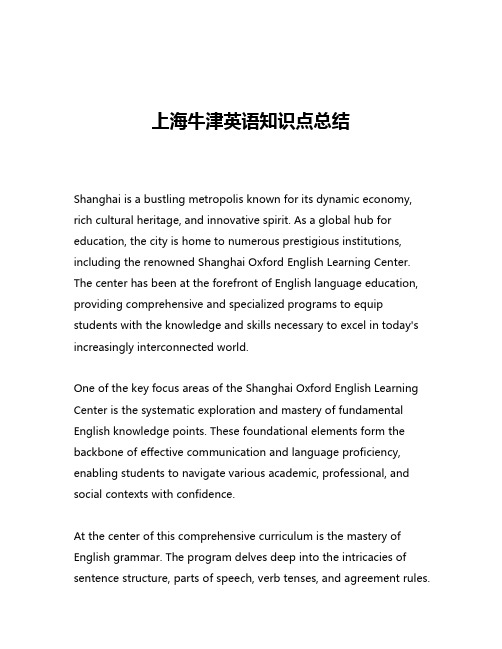
上海牛津英语知识点总结Shanghai is a bustling metropolis known for its dynamic economy, rich cultural heritage, and innovative spirit. As a global hub for education, the city is home to numerous prestigious institutions, including the renowned Shanghai Oxford English Learning Center. The center has been at the forefront of English language education, providing comprehensive and specialized programs to equip students with the knowledge and skills necessary to excel in today's increasingly interconnected world.One of the key focus areas of the Shanghai Oxford English Learning Center is the systematic exploration and mastery of fundamental English knowledge points. These foundational elements form the backbone of effective communication and language proficiency, enabling students to navigate various academic, professional, and social contexts with confidence.At the center of this comprehensive curriculum is the mastery of English grammar. The program delves deep into the intricacies of sentence structure, parts of speech, verb tenses, and agreement rules.Students engage in extensive practice exercises and interactive lessons to internalize these grammar principles, ensuring they can construct clear and coherent sentences in their written and spoken expression.Alongside grammar, the learning center places a strong emphasis on vocabulary development. Through targeted thematic units and word-building strategies, students expand their lexical repertoire, learning the meanings, connotations, and appropriate usage of a diverse range of words. This approach not only enhances their ability to comprehend and interpret complex texts but also empowers them to articulate their ideas with greater precision and nuance.In addition to the foundational elements of grammar and vocabulary, the Shanghai Oxford English Learning Center also places a significant focus on the development of essential language skills. These include reading comprehension, writing proficiency, listening aptitude, and effective oral communication. Students engage in a variety of exercises and activities designed to hone these skills, preparing them for the demands of academic studies, professional contexts, and everyday interactions.One of the unique aspects of the center's approach is its integration of interactive technology and multimedia resources. Leveraging the latest advancements in language learning software and digitalplatforms, students are immersed in interactive lessons, virtual simulations, and personalized feedback systems. This blended learning model not only enhances the overall learning experience but also cultivates essential digital literacy skills, equipping students with the technological fluency required in the 21st-century workplace.Moreover, the Shanghai Oxford English Learning Center recognizes the importance of cultural awareness and cross-cultural communication in the global arena. Through cultural exchange programs, intercultural workshops, and exposure to authentic English-speaking environments, students develop a deeper understanding and appreciation for diverse cultural perspectives. This intercultural competence enables them to navigate the complexities of international settings with greater sensitivity and effectiveness.Beyond the core curriculum, the learning center also offers specialized tracks and elective courses tailored to the unique needs and interests of its students. These include business English, academic writing, exam preparation, and language immersion programs. By providing these targeted offerings, the center ensures that students can customize their learning journey to align with their individual goals and aspirations.The success of the Shanghai Oxford English Learning Center can be attributed to its dedicated team of highly qualified instructors. These educators are not only experts in their respective fields but also possess a deep understanding of the challenges and nuances of language learning. They employ a student-centric approach, adapting their teaching methodologies to the diverse learning styles and needs of their students.Through ongoing professional development, regular curriculum updates, and a commitment to research-based best practices, the instructors at the center remain at the forefront of language education, continuously enhancing their skills and knowledge to provide the most effective and engaging learning experiences.The impact of the Shanghai Oxford English Learning Center extends far beyond the confines of the classroom. Graduates of the program have gone on to excel in a wide range of academic, professional, and personal endeavors, leveraging their strong English language proficiency to navigate the global landscape with confidence and success.Whether pursuing higher education, securing sought-after positions in multinational corporations, or engaging in cross-cultural initiatives, these alumni have become ambassadors for the transformative power of English language education. Their achievements serve as atestament to the center's commitment to empowering individuals and fostering a new generation of global leaders.As Shanghai continues to solidify its position as a world-class city, the Shanghai Oxford English Learning Center remains a beacon of excellence in language education. By providing comprehensive and innovative programs, the center is not only shaping the linguistic abilities of its students but also contributing to the broader cultural and economic development of the region.Through its unwavering dedication to excellence, the learning center has become a model for language education institutions around the world, inspiring others to emulate its holistic approach and commitment to fostering global competence. As the city of Shanghai continues to evolve and thrive, the Shanghai Oxford English Learning Center will undoubtedly play a pivotal role in cultivating the linguistic and intercultural skills that will drive the city's future success.。
上海牛津英语知识点及语法重点
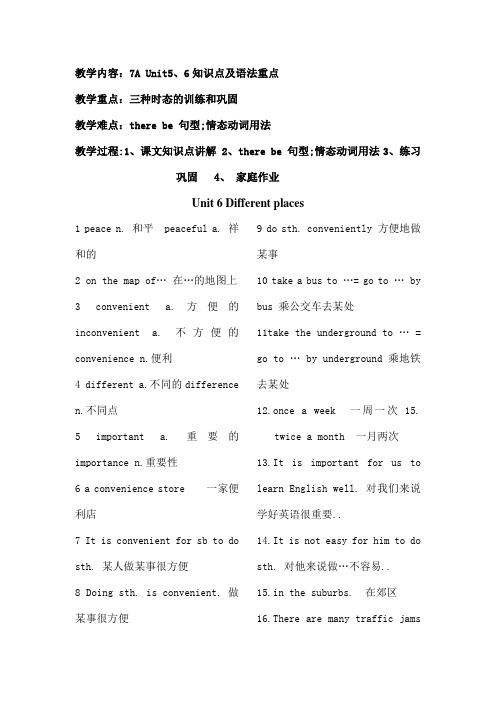
教学内容:7A Unit5、6知识点及语法重点教学重点:三种时态的训练和巩固教学难点:there be 句型;情态动词用法教学过程:1、课文知识点讲解 2、there be 句型;情态动词用法3、练习巩固 4、家庭作业Unit 6 Different places1 peace n. 和平 peaceful a. 祥和的2 on the map of…在…的地图上3 convenient a.方便的inconvenient a. 不方便的convenience n.便利4 different a.不同的difference n.不同点5 important a. 重要的importance n.重要性6 a convenience store 一家便利店7 It is convenient for sb to do sth. 某人做某事很方便8 Doing sth. is convenient. 做某事很方便9 do sth. conveniently 方便地做某事10 take a bus to …= go to … by bus 乘公交车去某处11take the underground to … = go to … by underground 乘地铁去某处12.once a week 一周一次15.twice a month 一月两次13.It is important for us to learn English well. 对我们来说学好英语很重要..14.It is not easy for him to do sth. 对他来说做…不容易..15.in the suburbs. 在郊区16.There are many traffic jams有许多交通堵塞..at the bottom of some steep steps 在陡峭的台阶下面on top of the mountains 在山顶relax oneself 自我放松17. please v. –pleasant a. – pleased a. 取悦;使愉快–令人愉快的–感到愉快的18. please sb. 取悦某人;使某人高兴19. the changes to the lives 生活中的变化20. life in different seasons 不同季节的生活21. seasonal changes 季节的变化22. falling leaves 落叶23. fall -- fell – fallen 落下24. This pair of gloves is black. 这副手套是黑色的..25. The gloves are black.这手套是黑色的..26. What season is it 是什么季节27. in different places 不同的地方be different from …/ the same … as…differences between … and …28.It is + adj + to do sth 做…很…29. once a week 一周一次twice a week 一周两次 three times a week30. noise n. 噪音noisy adj. 嘈杂的noisy; noisier; noisiest31. exciting adj. 令人激动的/excited adj. 感到激动的excite v. 使激动;使兴奋excitement n. 激动;兴奋32. pleasant adj/ 使人愉快的please v. 使高兴 pleased adj. 高兴的;be pleased with sth 对…感33. leaf n. 树叶 leaves pl.到满意的pleasure n. 高兴;愉快 It’s my pleasure.1 现在进行时的用法一、选择题1. Who _____ over there nowA. singingB. are singC. is singingD. sing2. It’s eight o’clock. The students _____ an English class.A. haveB. havingC. is havingD. are having3. Listen The baby _____ in the next room.A. cryingB. criedC. is cryingD. cries4. Look The twins _____ new sweaters.A. are wearingB. wearingC. are wearD. is wearing5. Don’t talk here. Grandparents _____.A. is sleepingB. are sleepingC. sleepingD. sleep6. Tom is a worker. He _____ in a factory. His sisters _____in a hospital.A. work/ workB. works/ workC. is working / are working7. Who _____ English best in your classA. speakB. speaksC. speaking8. Mrs Read _____ the windows every day.A. is cleaningB. cleanC. cleansD. cleaning9. We _____ music and often _____ to music.A. like/ listenB. likes/ listensC. like/ are listening10. She _____ up at six in the morning.A. getB. getsC. getting11. On Sunday he sometimes _____ his clothes and sometimes _____ some shopping.A. wash/ doB. is washing/ is doingC. washes/ does12. The twins usually _____ milk and bread for breakfast; but Jim _____ some coffee for it.A. have/ haveB. have/ hasC. has/ haveD. having / having二、填空:1. My father always __________come back from work very late.2. The teacher is busy. He __________ sleep six hours a day.3. Listen Joan __________sing in the classroom. She often__________ sing there.4. Where __________ you __________ have lunch every day5. The girl __________like wearing a skirt. Look She __________weara red skirt today.2 掌握when引导时间状语从句的用法3 学会运用because引导的原因状语从句4 there beThere be 句型用法总结There be 结构是英语中陈述事物客观存的常用句型;表示“有”;其确切含义是“存在”there作为引导词;本身没有意义;用动词be的某些形式作为谓语动词;它的主语是用一些表示泛指或不定特指的名词词组;动词be和主语的数必须一致..句子最后通常为表示地点和时间的状语..因此要表达“某个地方或某个时间存在什么事物或人”的时候常用“There be + 名词+ 地点时间这一句型..例如:There is a great Italian deli across the street.穿过街道;有一家大的意大利熟食店..There are some students in the dormitory.在宿舍里有一些学生..一、There be 结构中的主谓一致1.当动词be后所接的名词是单数可数名词或不可数名词时;be 应该取单数is;当其后所接的名词是复数的可数名词时;be用复数are..There's a man at the door.门口有个人..There is some apple juice in the bottle.瓶子里有些苹果汁..There are some strangers in the street.大街上有一些陌生人..2.如果There be 后面是几个并列名词做主语时;动词be的形式和最靠近它的那个名词保持数的一致..There is an ashtray and two bottles on the shelf. 架子上有一只烟灰缸和两个瓶子..There are two bottles and an ashtray on the shelf. 架子上有两个瓶子和一个烟灰缸..二、There be 结构中的时态1.There be 句型中动词be可以有一般现在时、一般过去时、将来时和完成时..There is no harm in trying.不妨一试..There were fabulous wildflowers in the hills last spring.去年春天;山中有极美的野花..There will be a fine day tomorrow.明天将是一个晴天..There have been several private schools in our area this year. 今年;我们这里已经有好几所私立学校了..2.There be 句型可以和各种助动词、情态动词连用..There may be a cigarette in that box.那只盒子里或许有支香烟..There must be some cakes on the table.桌子上一定有些蛋糕..There used to be a hospital there before the war.战前;那里曾经有家医院..3.There be 句型也可以和这样一些的谓语动词连用:be going to 、seem to 、appear to 、usedto、be likely to 、happen to ….There seem to be a few trees between me and the green.在我与草坪之间好像有一些树..There is gong to be a meeting tonight.今天晚上有个会议..There is likely to be a storm.可能有一场暴雨..There happened to be a bus nearby.碰巧附近有辆公交车..There appears to have been a nasty accident.似乎发生了一起严重事故..4.there be 结构中除可以用be 外;还可以用其它动词..例如:There came a scent of lime-blossom.飘来一阵菩提树的花香..Once upon a time there lived a king in China.从前中国有一个国王..三、There be 句型的否定句、一般疑问句、特殊疑问句和反意疑问句1.There be 句型的否定句有两种构成方式;一种是将否定副词not放在be 之后;如:There isn’t a box inthe room.房间里没有盒子..There aren’t any pens on the desk.课桌上没有钢笔..2.There be 句型的一般疑问句是将be 放在there 之前;回答时用yes或no;后接简单答语..如:Is there a cake on the table桌子上有块蛋糕吗Yes;there is. / No;there isn’t.是;有../ 不;没有..Will there be a party tonight今晚有聚会吗Yes;there will./ No; there won’t是的;有../ 不;没有..3.There be 句型的特殊疑问句主要有how many和how much做引导词两种情况:How many students are there in your school你们学校有多少学生How much money is there in your pocket你口袋里有多少钱4.There be 句型的反意疑问句There is a cup on the table; isn’t there桌子上有只杯子;是吗There is some orange in the glass; isn’t there杯子里有桔汁;是吗四、There be 结构和have的区别与联系1.区别点:there be 意为存在;强调某地有某物;不表示所属关系;have 表示所有关系;强调某人或某地有某物;这是其基本用法..如:There are some trees in front of the house.房前有些树..Tom has many friends in China.汤姆在中国有许多朋友..2.相同点:在表示结构上的含有时;既可以用there be 句型;也可以用havehas 来表示..如:中国有许多长河..There are many long rivers in China.China has many long rivers.一、句型转换1. There is a computer in my house. 一般疑问句________ ________ a computer in ________ house2. There are some flowers on the teachers’ desk. 一般疑问句_________ ________ _________ flowers on the teachers’ desk3. There are some apples on the tree.否定式 There ________ _________ ________ apples on the tree.4. There aren’t any pears in the box.同义句 There are _________ pears in the box.5. There are fifty students in my class.对划线部分提问________ __________ students are there in your class6. These are cars.用buses改写成选择疑问句 Are thesecars__________ __________7. Two boys are in our house.改为there be句型__________ __________ two boys in our house.二、选择1. The students expected there ________ more reviewing classes before the final exam.A. beB. beingC. have beenD. to be2. There _________ no fresh drinking water and no good farm land; it was not a comfortable place in which to live.A. beB. wasC. wereD. being3. Where _________ dirt; there are flies.A. there hasB. isC. there isD. has there4. There _________ an English teacher and 40 students in the classroom.A. isB. areC. haveD. being5 用以wh- 开头的特殊疑问句进行提问6 掌握“it takes + 时间”的句型1.指时间、季节、天气、距离等..It is 5 kilometers from my home to the school.2.指环境情况等.. It was very noisy outside now. 3.用作人称代词;代替前面提到过的事物..The bike is not mine. It’s Petre’s.4.用以代替指示代词this 或that..---What’s this ---It’s a pen. 5.具有指示代词的作用;指一个人或事物..---Who’s knocking at the door ---It’s me.7 掌握“it is + 形容词+ to do ...”的句型It is + adj + for/of sb to do sth.1.it为形式主语2.不定式表示的动作是由for引导的逻辑主语发出的3.to do sth为真实主语4.用for 的形容词:对事物进行描述的形容词difficult easy hard important necessary convenient dangerous possible impossibleeg: It is difficult for me to choose the right style.It is good for us to eat vegetables.注意:有时可以不带逻辑主语eg: It is wrong to laugh at others when they are in difficulty.It is impossible to learn a language well in two months.用of的形容词:表示人的性格品格的形容词kind good bad nice right wrong wise silly foolish clever careless polite generous rudeeg: It was wrong of him to tell lies.It is stupid of her to make such a mistake.It’s nice of you to offer me a seat.= You are nice to offer me a seat.It was careless of him to lose so many things. = He was careless to lose so many things.语法要点2: adj+ enough to do sth 当主语与to do sth的逻辑主语不一致时用此句型1.adj/adv+ enough enough time fast enough2.enough for sb to do stheg: Her hair is long enough for her to tie back.The question is hard enough for Tom to reply to.3.同义句转换 too… to = not …enough to do sth = so … that …\The boy is too young to go to school.= The boy is not old enough to go to school.= The boy is so young that he can’t go to school.8 掌握乘坐交通工具的两种用法: by...;take the...9 掌握some;any;much; a lot of的用法Unit 7 Signs around us1. direct v. 导向 direction n.方向 director n. 导演2. instruct v. 指导instruction n. 指示3. hike v. hiked – hiked –hiking 远足4. go hiking in the countryside在乡下远足5. No cigarettes. = No smoking.= You mustn ’t smoke. = Don ’tsmoke. 不准吸烟..6. No litter. = You mustn ’tleave rubbish. = Don ’t leaverubbish. 不准乱扔垃圾..7. silent adj. --- silence n.沉默的—沉默8. different adj. –difference n. 不同的—不同点9. important adj. –importance n. 重要的—重要性 10. convenient adj. – convenience n. 方便的 – 便利 11. keep silent = keep quiet 保持安静 12. put up tents and go camping 支起帐篷去野营 13. use v. 使用– useful a. 有用的 useless a.没有用的 14. help v. 帮助helpful a. 有帮助的 helpless a. 没有帮助的 15. care v. 在意– careful a. 仔细的 careless a.不仔细的 16. What does it mean = What ’s the meaning of … 它是什么意思 17. take turns to do sth. 轮流做某事 18. have rules to take care of the environment. 有规则是无论照顾环境.. 19. It ’s your turn to do sth. 轮到你做某事了..20. do sth. silently = do sth. insilence 静悄悄地做某事 21. exit v. 出去 --反-- enter v. 进入 22. exit n. 出口 --反-- entrance n. 入口23. use the telephone for help =call for help 用电话求助24. What does this sign mean =What is the meaning of this sign这个标志是什么意思 mean v. meant; meant meaning n. 25. turn left = turn to the left 向左转on the right of …在......右边26. silent a 安静的 silence n 安静 27. We must not smoke.= No smoking.= Don’t smoke. smoke n. 烟雾 v. 抽烟 28. Good luck 好运 lucky a 幸运的 luckily adv. 幸运地unluckily ad.29. finish doing 完成做某事1 掌握情态动词can 和must 在本单元中的用法1. can 的用法:1.表示能力、许可、可能性.. 表示能力时一般译为“能、会”; 即有种能力;尤其是生来具备的能力;此时may 和must 均不可代替它..如:She can swim fast; but I can’t . 她能游得很快;但我不能..I can see with my eyes. 我用眼睛看..2.表示许可;常在口语中..如:You can use my dictionary. 你可以用我的字典..3.表示推测;意为“可能”; 常用于否定句和疑问句中; 此时can’t 译为“ 不可能”.. 如:Can the news be true 这个消息会是真的吗—Can it be our teacher那个人有可能是我们老师吗—No; it can’t be our teacher. He is on a visit to the Great Wall.不可能..咱们老师正在游览长城呢..例题—I think Miss Gao must be in the library. She said she would go there. —No. She __be there; I have just been there. A.can’t B.mustn’t C.needn’t D.wouldn’t解析根据下文“我刚去过那儿”可知;应为“ 不可能”; can’t 表示推测答案 A2. could的用法:1.can的过去式;意为“ 能、会”;表示过去的能力..如:He could write poems when he was 10. 他十岁时就会写诗..2. could在疑问句中;表示委婉的语气;此时 could 没有过去式的意思..如:Could you do me a favour 你能帮我个忙吗—Could I use your pen 我能用一下你的钢笔吗—Yes; you can.可以..注意回答3. may的用法:1.表示请求、许可;比can 正式;如:May I borrow your bike 我可以借你的自行车吗 You may go home now. 现在你可以回家了..例题—_______ I borrow your MP3 —Sure . Here you are.A. MayB.ShouldC.MustD. Would2 .表示推测;谈论可能性;意为“ 可能; 或许”;一般用于肯定句中.. 如:It may rain tomorrow . 明天可能会下雨..She may be at home. 她可能在家呢.3 .may的过去式为might ;表示推测时..可能性低于may.. 如:He is away from school. He might be sick.他离开学校了;可能是他生病了..4 . 表示希望、祈求、祝愿;常可译为“祝愿”..通常是用may +主+V 例如:May you have a good time. 祝你过得愉快.. May you be happy 祝你幸福 May you succeed祝你成功4. must的用法:1.must 表示主观看法;意为“必须、一定”.. 如:You must stay here until I come back.在我回来之前你必须呆在这儿..Must I hand in my homework right now 我必须现在交作业吗2 其否定形式mustn’t表示“ 一定不要” “千万别” “禁止; 不许”. 如:You mustn’t play with fire. 你不许玩火..You mustn’t be late. 你一定不要迟到..3对must引导的疑问句;肯定回答为must;否定回答为needn’t 或don’t have to .如:—Must I finish my homework我现在必须完成作业吗—No; you needn’t.不;你不必..4must表示有把握的推测;用于肯定句..如: The light is on; so he must be at home now.灯亮着;他现在肯定在家..注意其反意问句的构成形式:当must表示肯定的判断、推测时;其反意疑问句要用实际问句的助动词来构成..如:She must have seen the film before;hasn’t she注意反意疑问句的后半部分You must have met uncle Wang in the shop yesterday;didn’t you 注意反意疑问句的后半部分5. need的用法:1.need 表示需要、必须;主要用于否定句和疑问句中;其否定形式为needn’t;意为“没有必要;不必”.. 用need 提问时;肯定回答为 must;否定回答为needn’t或don’t have to.. 如:—Need I stay here any longer 我还有必要留在这儿吗—Yes; you must .是的..—No. you needn’t /don’t have to. 不; 你不必..2.need 还可以作实义动词;此时有人称、数和时态的变化;如果是人作主语后边多接动词不定式..如:I need to do it right now. 我需要马上做这件事..He needs to learn more about the girl.他需要多了解那个女孩..如果是物作主语;一般用need doing 与 need to be done这种情况下应注意两点:①.主动形式的动名词doing具有被动的含义;②.该动名词可以改为其动词不定式的被动形式而句子的意义不变..例如:. The door needs painting. = The door needs to be painted. 那扇门需要油漆一下..Your car needs mending. = Your car needs to be repaired. 你的车需要维修了..can’t 和 mustn’t1. can’t 根据其基本用法可译为:1不会..如:I can’t speak English . 我不会说英语..2不能..如:We can’t do it now because it’s to o dark.天太黑了;我们现在干不了..3否定句中表示推测..“不可能”;如:The man can’t be our teacher because he is much younger than our teacher.. 那个人不可能是咱们老师;他年轻得多..2. mustn’t 意为“ 禁止、不许”; 用来表达命令;表示强烈的语气.. 如:You mustn’t play football in the street. It’s too dangerous.你不可以在街上踢足球;太危险了..易混点五:must 和 have to1.must 侧重于个人意志和主观上的必要..have to 侧重于客观上的必要;可用于现在时、过去时和将来时..如:I know I must study hard.我知道我必须努力学习..My brother was very ill; so I had to call the doctor in the mid-night.我弟弟病得厉害; 我只得半夜里把医生请来..I haven’t got any money with me; so I’ll have to borrow some from my friend.我身上没带钱;只好向朋友借点了..He said they must work hard.他说他们必须努力工作..2. have to可以用于多种时态;而must只用于一般现在或将来..如:The composition is due to hand in this morning; so I had to finish it last night. 作文今天早晨到期;因此我不得不昨天晚上完成..易混点六: used to do / be used to doing / be used to do…/ be used for doing sthused to do 表示过去常常发生的动作; 强调过去;只用于过去;注意用 todo;不用doing形式;而be used to doing 意为“习惯做…”; be 可有各种时态; be used to do 意为“……被使用去做……;”为被动语态形式..be used for doing sth“用作……”如:My father used to eating meat.我父亲过去起床晚;但现在不得不早起了..She is used to eating meat.她习惯吃肉..He wasn’t used to eating in a restaurant.他不习惯在饭店吃饭..A knife can be used for cutting things.刀可以用来割东西/ A knife can be used to cut things.刀可以用来割东西情态动词练习1. May I stop my car here No; you____.A. can'tB. mustn'tC. needn'tD. don't have to2. Must we clean the house now No; you _______.A. needn'tB. may notC. mustn'tD. can't4. You return the book now. You can keep it next week if you like.A. can'tB. mustn'tC. needn'tD. may not5. Johnny; you play with the knife; you hurt yourself.A. won't...can'tB. mustn't...mayC. shouldn't; mustD. can't...shouldn't6. The fire spread through the hotel very quickly but everyone get out.A. had toB. wouldC. couldD. was able to7. Would you go out for a walk with meNo; I_____..My girl friend is coming.A. wouldn'tB. shall notC. won'tD. shouldn't8. Man die without water. A. will B. can C. need D. shall9. If he started at 9 0'clock; he be there by now.A. needB. shallC. ought toD. must10. I mailed the letter two weeks ago. She_____it.A. must receiveB. can't receiveC. might receiveD. must have received11.The professor gave orders that the experiment before 5:30p.m.A. be finishedB. will finishC. must be finishedD. would be finished12. There was plenty of time. You_____.A. mustn't hurryB. mustn't have hurriedC. needn't hurryD. needn't have hurried13. Tom was a diligent boy. He go to school though it was raining hard.was able to B. could C. couldn't D. wasn't able to14. ______I go back before lunch No; I don't think you________.A. Need...mustB. Do...need toC. Must...have toD. May .... ought to15. The teacher do all the exercises; but a pupil_______.A. needn't....mustB. may not...mustC. needn't....needn'tD. can't....must16. Would you open the window please Yes; I______.A. willB. wouldC. doD. can17. A lion only attacks a human being when it is hungry.A. shouldB. canC. willD. shall18. ____Must I finish this novel this morning____No; you_____.A. mustn'tB. might notC. don't have toD. can't19. The taxi ____ only hold six passengers. It is full. You take the next one.A. may...mayB. can...mayC. may...canD. must...can21. I wish to go home now; IA. mayB. can'tC. mustD. do22. He must have finished his homework; _____heA. mustn'tB. didn'tC. needn'tD. hasn't3 了解turn作名词和动词的用法4 了解land作名词和动词的用法5 学会用“what kind of + 名词”询问种类。
牛津高二英语第一单元知识点(上海版)

教师姓名司晓娜学科英语填写时间学生姓名杜昊程董雪婷年级高二教材版本牛津版课题名称倒装的运用+Unit1知识点上课时间重点难点全部倒装与部分倒装的用法及区分教学过程 Grammar英语最基本的语序是主语在前,谓语动词在后。
但有时由于句子结构的需要或表示强调,就要采用倒装形式。
将谓语动词完全移到主语之前称为完全倒装,只将助动词或情态动词放到主语之前称为部分倒装。
强调性倒装和以so, neither, nor开头的句子是高考例题的热点。
(1)倒装句的意义1、适应一定的语法结构的需要,主要是指疑问句句型结构的需要。
e.g. May I come in?Was the People’s Liberation Army founded in 1927?2、为了强调某一部分,而把这部分放到句首,构成倒装。
e.g. Never have I been late for school this term.So early did he come to school that no other students came.(2)倒装的使用情况1、在“there be”结构里,there是引导词,主语在be后。
e.g. There is a box on the table.2、在疑问句中。
e.g. Is she singing in the classroom?What does your mother do?3、在here, there等副词开头的某些句子里(要用一般现在时态)。
如果主语是人称代词,主语和主要动词的词序不变。
(完全倒装)e.g. There goes the bell.Here is an apple for you.There she comes.4、重复倒装句型,用在以so, nor, neither开头,表示谓语所述的情况也适用于另一个人或一事物的肯定或否I.学校书本知识同步复习Ⅱ. .本次课内容讲解Ш.学生疑难问题解决Ⅳ.练习定句中。
新版牛津英语上海版A知识点归纳

新版牛津英语上海版A知识点归纳1.问候与自我介绍:- Hello! Hi! Good morning!等常见的问候用语。
- What’s your name? My name is...等自我介绍用语。
2.数字与颜色:-数字1-10的基本表达。
- 常见颜色的英文表达,如红色(red)、绿色(green)等。
3.询问年龄与身体状况:- How old are you? I’m...等询问年龄的用语。
- How are you? I’m fine/good.等询问身体状况的用语。
4.询问喜欢与不喜欢的事物:- Do you like...? Yes, I do./No, I don’t.等询问喜欢事物的用语。
- What do you like? I like...等回答自己喜欢的事物的用语。
5.熟悉家庭与常见动物:- 基本的家庭成员的表达,如father、mother、brother、sister等。
- 常见动物的英文表达,如dog、cat、bird等。
6.询问与描述外貌与人物特征:- What’s he/she like? He/She is...等询问与描述外貌与人物特征的用语。
7.学习日常用语:- May I go to the toilet, please? Can I have some water, please?等日常学习用语。
8.描述天气与季节:- What’s the weather like today? It’s sunny/rainy/cloudy.等描述天气的用语。
- 四个季节的英文表达,如spring、summer、autumn、winter等。
9.描述日常活动与习惯:- I get up at 7 o’clock. I go to school at 8 o’clock.等描述日常活动与习惯的用语。
10.描述食物与饮料:- 常见食物与饮料的英文表达,如apple、orange、milk、juice等。
沪教版(上海)牛津英语知识点汇总

沪教版(上海)牛津英语知识点汇总Module1Unit1一,核心词汇1.first第一2.second第二3.third第三4.fourth第四5.fifith第五6.sixth第六7.party派对,聚会8.begain 开始9.bring带来10.wear穿着11.favourite最喜欢的二,词组1.at Peter’s birthday party在Peter的生日聚会上2.on the19th of September在9月19日3.on Sunday在周日4.at two o’clock在两点5.in the afternoon在下午6.at night在晚上7.sb.be tired 某人很累8.my favourite color我最喜欢的颜色9.That sounds interesting.那听上去有趣10.I can’t wait!我等不及了!11.Happy Birthday!生日快乐12.Welcome to my party.欢迎来我的派对13.a pair of orange trousers一条橙色的裤子14.make a birthday invitation制作一张生日请帖15.make a hat制作一顶帽子16.have some fun过得高兴17.birthday present生日礼物三,词汇解释1.bring,take,carry辨析bring是指把人或物从别处带到说话人所在的地方。
例如:Bring me some water, please.请给我取点水来。
carry及物动词,“搬运,运送”,一般是指搬运较重的物品。
例如:carry a box on one’s shoulder扛着箱子carry a baby on one’s back背着孩子“携带,带”例如:Almost every teacher carries a watch.差不多每位教师都带着一只表。
牛津上海高一下英语知识点
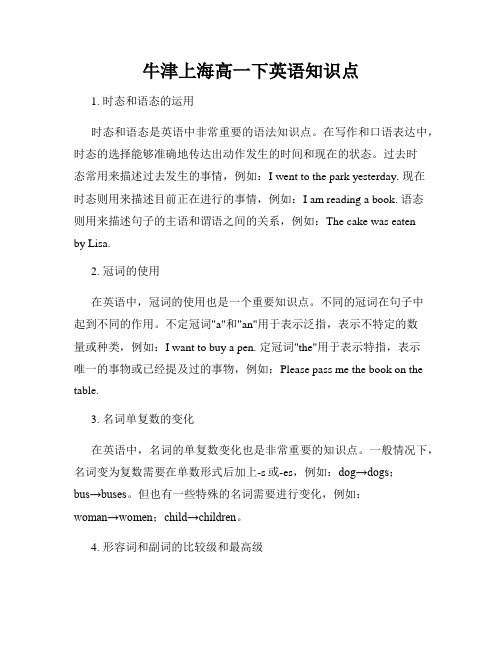
牛津上海高一下英语知识点1. 时态和语态的运用时态和语态是英语中非常重要的语法知识点。
在写作和口语表达中,时态的选择能够准确地传达出动作发生的时间和现在的状态。
过去时态常用来描述过去发生的事情,例如:I went to the park yesterday. 现在时态则用来描述目前正在进行的事情,例如:I am reading a book. 语态则用来描述句子的主语和谓语之间的关系,例如:The cake was eatenby Lisa.2. 冠词的使用在英语中,冠词的使用也是一个重要知识点。
不同的冠词在句子中起到不同的作用。
不定冠词"a"和"an"用于表示泛指,表示不特定的数量或种类,例如:I want to buy a pen. 定冠词"the"用于表示特指,表示唯一的事物或已经提及过的事物,例如:Please pass me the book on the table.3. 名词单复数的变化在英语中,名词的单复数变化也是非常重要的知识点。
一般情况下,名词变为复数需要在单数形式后加上-s或-es,例如:dog→dogs;bus→buses。
但也有一些特殊的名词需要进行变化,例如:woman→women;child→children。
4. 形容词和副词的比较级和最高级形容词和副词的比较级和最高级也是英语中需要掌握的重点之一。
在比较级中,通常在形容词或副词后加上-er,例如:fast→faster。
而在最高级中,通常在形容词或副词前加上the并在后面加上-est,例如:fast→the fastest。
另外,也有一些特殊的形式需要掌握,例如:good→better→the best。
5. 定语从句和状语从句定语从句和状语从句是英语中常用的从句结构。
定语从句用来修饰名词或代词,通常以关系代词或关系副词引导,例如:The book that I bought is very interesting. 状语从句则用来表示时间、原因、目的、条件等,通常以连词引导,例如:I will go to the park if it doesn't rain.6. 动词不定式和动名词动词不定式和动名词也是英语中需要掌握的重要知识点。
上海牛津英语高一下知识点
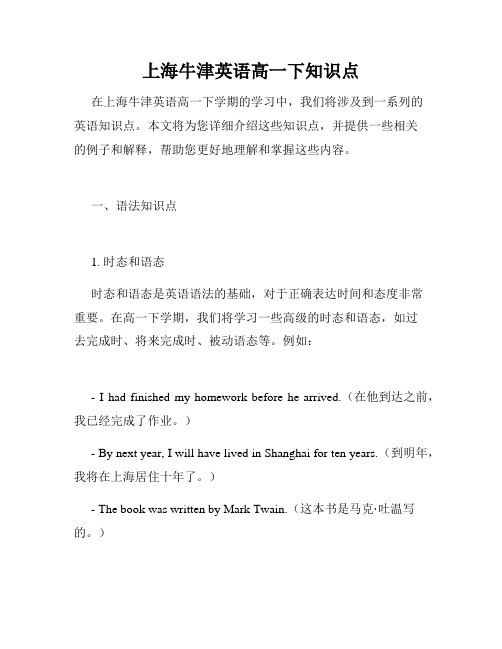
上海牛津英语高一下知识点在上海牛津英语高一下学期的学习中,我们将涉及到一系列的英语知识点。
本文将为您详细介绍这些知识点,并提供一些相关的例子和解释,帮助您更好地理解和掌握这些内容。
一、语法知识点1. 时态和语态时态和语态是英语语法的基础,对于正确表达时间和态度非常重要。
在高一下学期,我们将学习一些高级的时态和语态,如过去完成时、将来完成时、被动语态等。
例如:- I had finished my homework before he arrived.(在他到达之前,我已经完成了作业。
)- By next year, I will have lived in Shanghai for ten years.(到明年,我将在上海居住十年了。
)- The book was written by Mark Twain.(这本书是马克·吐温写的。
)2. 从句和宾语从句从句是复杂句中的一个重要组成部分,能够丰富句子的表达方式。
宾语从句作为从句的一种,通常用来作为主句的宾语。
例如:- I know that he is coming to visit us tomorrow.(我知道他明天要来看我们。
)- She asked if I had finished my homework.(她问我是否完成了作业。
)3. 连词和关联词连词和关联词是连接句子和句子、连接词组和词组之间的重要工具,可以帮助我们更好地组织句子,使之更加连贯。
例如:- I like both playing basketball and swimming.(我既喜欢打篮球又喜欢游泳。
)- He was tired; however, he didn't stop working.(他很累,然而他没有停下来工作。
)二、词汇知识点1. 同义词和反义词同义词和反义词可以丰富我们的词汇量,使表达更加准确和多样化。
同义词指的是意义相同或相近的词语,而反义词则恰好相反。
上海高中英语牛津教材个单元语法考点梳理课件(精细)

咆哮的二十年代joy-to-sadness率达到了一个知道最近的经济危机前不会再 发生的顶峰”,就会直观地看到两个明显的时间点“During the Roaring Twenties ”“Second World War”
高一上unit3
▪ 语法点:被动语态
▪ 考查内容:8种时态的被动语态,主动表被动的特殊情况。
高一下unit1
▪ 语法点:动名词作主语&宾语
▪ 考查内容:动名词作主语,动名词作动词和介词的宾语
▪ 考查方式:语法填空,翻译 I don’t mind (30)___ (make) money. (2014高三一模) 答案:making 易错:to make 解析:学生知道动词后填to do或者doing,但是对于具体是那
高一上unit1
▪ 语法点:时态复习
▪ 考查内容:动词的10种时态——一般现在时,一般过去式,现在进 行时,过去进行时,现在完成时,过去完成时,一般将来时,过去将 来时,现在完成进行时,将来进行时(两个一般,两个进行,两个完 成,两个将来,现在完成进行时,将来进行时)
▪ 考查方式:听力,语法填空,十一选十,翻译 ▪ To make things worse, her altimeter (高度表) failed and she didn’t
上海版牛津英语9A知识点整理(单词

上海版牛津英语9A知识点整理(单词以下是《上海版牛津英语9A》教材中的一些重要单词知识点的整理:Unit 1:1. actually - 实际上2. argument - 争论3. attitude - 态度4. behave - 表现5. calm down - 冷静6. challenge - 挑战7. concentration - 注意力8. control - 控制9. develop - 发展10. direct - 直接的11. distract - 分心12. essential - 必不可少的13. frustrate - 使沮丧14. ignore - 忽视15. insult - 侮辱16. maintain - 维持17. mood - 心情18. positive - 积极的19. respect - 尊重20. solution - 解决方案Unit 2:1. agriculture - 农业2. climate - 气候3. colony - 殖民地4. continent - 大陆5. environment - 环境6. extinct - 灭绝的7. glacier - 冰川8. impact - 影响9. improve - 改善10. industry - 行业11. limited - 有限的12. natural - 自然的13. pollution - 污染14. preserve - 保护15. protect - 保护16. region - 地区17. resource - 资源18. species - 物种19. threaten - 威胁20. waste - 浪费Unit 3:1. advance - 前进2. astronaut - 宇航员4. discover - 发现5. equipment - 设备6. exploration - 探索7. journey - 旅行8. launch - 发射9. orbit - 轨道10. planet - 行星11. reach - 到达12. research - 研究13. satellite - 卫星14. spacecraft - 航天器15. star - 星星16. technology - 技术17. universe - 宇宙18. vehicle - 车辆19. weightlessness - 失重20. worldwide - 全球的以上是《上海版牛津英语9A》教材中的一些重要单词知识点的整理。
(完整)沪教版(上海)牛津英语知识点汇总,推荐文档

沪教版(上海)牛津英语知识点汇总Module1Unit1一,核心词汇1.first第一2.second第二3.third第三4.fourth第四5.fifith第五6.sixth第六7.party派对,聚会8.begain 开始9.bring带来10.wear穿着11.favourite最喜欢的二,词组1.at Peter’s birthday party在Peter的生日聚会上2.on the19th of September在9月19日3.on Sunday在周日4.at two o’clock在两点5.in the afternoon在下午6.at night在晚上7.sb.be tired 某人很累8.my favourite color我最喜欢的颜色9.That sounds interesting.那听上去有趣10.I can’t wait!我等不及了!11.Happy Birthday!生日快乐12.Welcome to my party.欢迎来我的派对13.a pair of orange trousers一条橙色的裤子14.make a birthday invitation制作一张生日请帖15.make a hat制作一顶帽子16.have some fun过得高兴17.birthday present生日礼物三,词汇解释1.bring,take,carry辨析bring是指把人或物从别处带到说话人所在的地方。
例如:Bring me some water, please.请给我取点水来。
carry及物动词,“搬运,运送”,一般是指搬运较重的物品。
例如:carry a box on one’s shoulder扛着箱子carry a baby on one’s back背着孩子“携带,带”例如:Almost every teacher carries a watch.差不多每位教师都带着一只表。
(完整版)上海版牛津英语重点知识整(横版).doc
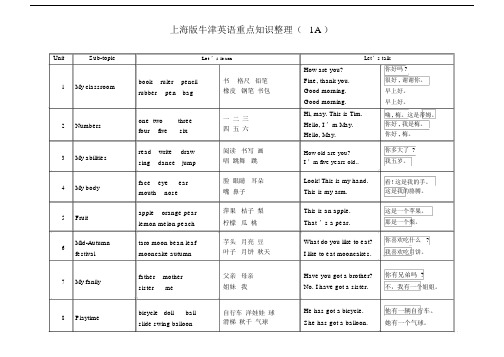
上海版牛津英语重点知识整理(1A )Unit Sub-topic Let ’s learn Let’s talk1 My classroom book ruler pencil rubber pen bag2 Numbers one two three four five six3 My abilities read write draw sing dance jump4 My body face eye ear mouth nose5 Fruit apple orange pear lemon melon peach6 Mid-Autumn taro moon bean leaf festival mooncake autumn7 My fanily father mother sister me8 Playtime bicycle doll ballslide swing balloon书格尺铅笔橡皮钢笔书包一二三四五六阅读书写画唱跳舞跳脸眼睛耳朵嘴鼻子萍果桔子梨柠檬瓜桃芋头月亮豆叶子月饼秋天父亲母亲姐妹我自行车洋娃娃球滑梯秋千气球How are you?Fine, thank you.Good morning.Good morning.Hi, may. This is Tim.Hello, I ’m May.Hello, May.How old are you?I ’m five years old..Look! This is my hand.This is my arm.This is an apple.That ’s a pear.What do you like to eat?I like to eat mooncakes.Have you got a brother?No. I have got a sister.He has got a bicycle.She has got a balloon.你好吗 ?很好 , 谢谢你。
上海版牛津英语9A知识点整理(单词,短语,句型)
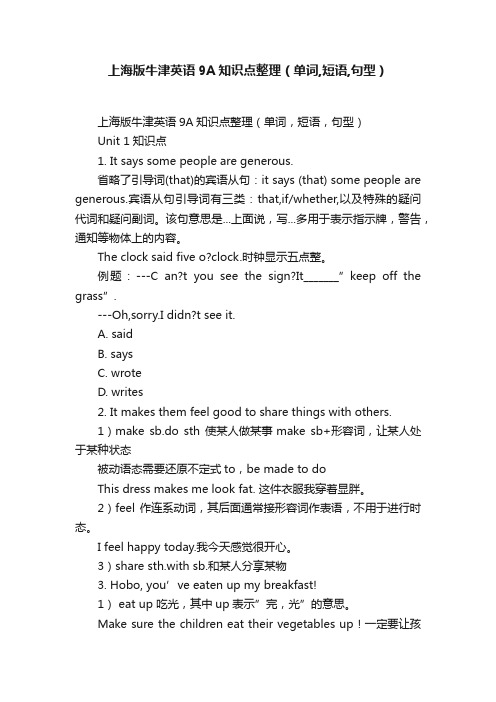
上海版牛津英语9A知识点整理(单词,短语,句型)上海版牛津英语9A知识点整理(单词,短语,句型)Unit 1知识点1. It says some people are generous.省略了引导词(that)的宾语从句:it says (that) some people are generous.宾语从句引导词有三类:that,if/whether,以及特殊的疑问代词和疑问副词。
该句意思是...上面说,写...多用于表示指示牌,警告,通知等物体上的内容。
The clock said five o?clock.时钟显示五点整。
例题:---C an?t you see the sign?It_______”keep off the grass”.---Oh,sorry.I didn?t see it.A. saidB. saysC. wroteD. writes2. It makes them feel good to share things with others.1)make sb.do sth 使某人做某事make sb+形容词,让某人处于某种状态被动语态需要还原不定式to,be made to doThis dress makes me look fat. 这件衣服我穿着显胖。
2)feel 作连系动词,其后面通常接形容词作表语,不用于进行时态。
I feel happy today.我今天感觉很开心。
3)share sth.with sb.和某人分享某物3. Hobo, you’ve eaten up my breakfast!1) eat up 吃光,其中up表示”完,光”的意思。
Make sure the children eat their vegetables up!一定要让孩子们把蔬菜吃光。
2)常见up短语burn up烧尽 use up用完drink up喝光例题1:---Why do you speak in ________ a loud voice?---Because I want to make myself _______ clearly.A. such; hearB. so; heardC. such; heardD. so; hear例题2:Xi Jinping, the new president of our government calls on us to ________ all the food each meal.A. eat upB. use upC. pick upD. cut up4. She keeps all her things in good order.Keep...in good order 使..保持井然有序The room is out of order,please keep it in order. 这房间乱七八糟,请收拾一下。
上海教材牛津版高一年级英语词汇考点(上册)Unit
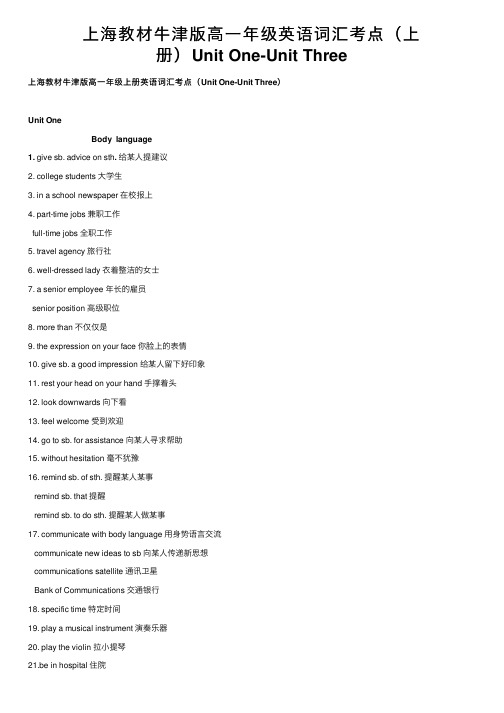
上海教材⽜津版⾼⼀年级英语词汇考点(上册)Unit One-Unit Three上海教材⽜津版⾼⼀年级上册英语词汇考点(Unit One-Unit Three)Unit OneBody language1. give sb. advice on sth.给某⼈提建议2. college students ⼤学⽣3. in a school newspaper 在校报上4. part-time jobs 兼职⼯作full-time jobs 全职⼯作5. travel agency 旅⾏社6. well-dressed lady ⾐着整洁的⼥⼠7. a senior employee 年长的雇员senior position ⾼级职位8. more than 不仅仅是9. the expression on your face 你脸上的表情10. give sb. a good impression 给某⼈留下好印象11. rest your head on your hand ⼿撑着头12. look downwards 向下看13. feel welcome 受到欢迎14. go to sb. for assistance 向某⼈寻求帮助15. without hesitation 毫不犹豫16. remind sb. of sth. 提醒某⼈某事remind sb. that 提醒remind sb. to do sth. 提醒某⼈做某事17. communicate with body language ⽤⾝势语⾔交流communicate new ideas to sb 向某⼈传递新思想communications satellite 通讯卫星Bank of Communications 交通银⾏18. specific time 特定时间19. play a musical instrument 演奏乐器20. play the violin 拉⼩提琴21.be in hospital 住院22. accept an invitation 接受邀请23. badminton match ⽻⽑球⽐赛24. best regards 良好的祝愿25. on a website 在⽹站上26. throughout the history of mankind 纵观⼈类历史27. in many situations 在许多场合下28. the key to communication 交流的关键29. in Western cultures 在西⽅⽂化中30. maintain eye contact 保持眼神交31. as a matter of fact 实际上32. show respect to 尊敬have respect for 尊敬in many respects 在许多⽅⾯respectable teacher 受⼈尊敬的⽼师be respectful to sb. 对某⼈彬彬有礼33. someone in authority 掌权的⼈当权者34. skim the passage 浏览段落skim through (over ) the newspaper 浏览报纸35. glance at us 扫视我们36. sigh with relief 宽慰的叹了⼝⽓sign deeply 深深地叹息37. recover from one’s illness 从疾病中恢复38. fax machine 传真机39. live in the suburbs 住在郊区live in downtown areas 住在市区40. prepare the table 摆桌⼦41. meet sb. by chance 偶然见到某⼈42. maintain good discipline 维持良好纪律43. consider doing 考虑做某事It is considerate of sb. to do sth. 某⼈很体谅地去做 a considerable amount of money ⼀⼤笔钱considerate = thoughtful 体谅他⼈的44. lack of common sense 缺乏常识lack money (vt.)be lacking in sth. 缺少(adj.)45. last for several days 持续⼏天46. avoid making mistakes 避免犯错误Unit TwoCare for hair1. younger people or elderly people 年轻⼈还是⽼年⼈2.suit your lifestyle 符合你的⽣活⽅式be suitable for 适合3.guarantee that 保证guarantee sth. 担保guarantee sb. sth. 向某⼈保证guarantee to do sth.保证做某事4.on top of the world 兴⾼采烈on the top of 在……之上,除……之外at the top of在...的顶上, 最⾼的5.get free advice from the experts 得到免费的专家咨询6.keep yourself healthy 使你⾃⼰健康7.a balanced diet 均衡的饮⾷8.get plenty of exercise 多锻炼9.in addition 另外10.look after 照看照料11.effective hair care 有效的头发护理12.squeeze out water 挤出⽔13.brush sth. thoroughly 彻底梳理14.loosen dirt 松弛污垢15.apply a conditioner 使⽤护发素16.shampoo your hair 洗头发17.set……at a low temperature 设定低温18.overuse hairdryer 过度使⽤吹风机19.hairdressing salon 美发厅20.dry out your hair 吹⼲你的头发21.convenience shop 便利店 commercial 电视⼴告23.in the leaflet 传单上24.work on 影响25.remove…..from 去除26.a furniture shop 家具店27.put an advertisement in the newspaper 报上刊登⼴告28.make an appointment for with sb. for you 为你安排约会29.meet sb. at a later date 后会有期30.miss an appointment 错过约会31.go on a business trip overseas 出国进⾏商务之旅32.ensure that 确保ck of protein 缺少蛋⽩质34.adequate amounts of green vegetables ⾜量的绿⾊蔬菜35.keep……from.....阻⽌做36.avoid doing sth.避免做…37.high-fat foods ⾼脂肪⾷品38.rob sb. of sth. 抢劫某⼈物品39.relaxing music 放松的⾳乐40.a remedy for sth.对……的⼀种补救41.look healthy 看上去很健康42.the keys to sth. 事情的关键43.apply……to……运⽤44.pay attention to 关注45.be careful about 关注注意46.meet one’s needs 满⾜要求47.dairy products 乳制品48.brush one’s hair regularly 经常梳理头发49.air-conditioner 空调Unit ThreeA taste of travel1. tourist attraction 游览胜地2. collect some information收集信息3. in the third century BC 公元前第三世纪4. construction of the museum 博物馆的建成5. be completed 竣⼯6. a magnificent structure 华丽的建筑7. from a distance 从远⽅at a distance 在稍远地⽅in the distance 在远处8. It take time to do sth. 花时间做某事9. historical items 历史⽅⾯10. preserve the old buildings 保护古⽼建筑11. only a few .只有⼏个Quite a few 许多12. the scenery along the river 沿河景⾊13. a beautiful landscape painting ⼀幅美丽的⼭⽔画14. be attracted by sth.被某事/⼈吸引15. odd peaks 古怪的⼭峰16. reflections in the water ⽔中的倒影17. take mud baths 洗泥浴18. art galleries 美术馆19. tourist spots 旅游景点20. preserve the traditions of the past 保护过去的传统21. future generations 后代⼦孙万代22. be of great importance 具有很⼤的重要性23. be admitted to some place 允许进⼊某地24. ancient building 古楼25. especially 尤其是26. specially 专门地27. be famous for 因某事⽽出名be famous as 作为-----⽽出名28. general meaning ⼤概意思29. look up 查单词30. raise the ticket price 提⾼门票价格31. put out the fire 灭⽕32. means of transport 交通路线transportation card 交通卡33. mark the route of the tour 标出旅⾏路线34. on one’s trip 旅游途中35. make a polite suggestion 提出礼貌的建议36. be willing to do sth.愿意做某事Be unwilling to do sth. 不愿做某事be likely to do sth. 很可能做某事37. would rather do sth.宁愿做某事38. be associated with 与----相关39. Carnival Festival 狂欢节40. at a nice hotel 在⼀家好的酒店41. ask for help with our trip 寻求旅游帮助42. make arrangements 做安排43. in addition 另外44. recommend a three-star hotel 推荐三星级酒店45. contact sb. by phone 电话联系46. places of interest 风景名胜47. in advance 提前48. take a trip overseas 出国旅⾏49. overlook the Nile River 俯瞰尼罗河50. abandon hope 放弃希望51. the Roman Empire 罗马帝国52.fall into ruin 成为废墟53. over time 随着时间的过去。
- 1、下载文档前请自行甄别文档内容的完整性,平台不提供额外的编辑、内容补充、找答案等附加服务。
- 2、"仅部分预览"的文档,不可在线预览部分如存在完整性等问题,可反馈申请退款(可完整预览的文档不适用该条件!)。
- 3、如文档侵犯您的权益,请联系客服反馈,我们会尽快为您处理(人工客服工作时间:9:00-18:30)。
Unit4
Family celebrations
名词性从句的虚拟语气
由suggest,insist,demand,reguire,ask等引导的宾语从句谓语动词可以用(should)+动词原形
高二下
Unit 1
Words and their stories
派生词
Unit 2
Making speeches
对话和复合词
Unit 3
On friendship
It +is/was+被强调的部分+that+其余部分
Unit 4
Amazing achievements
do引导的强调句
Unit 5
Great Scientists
it作为形式宾语
高二上
Unit 1
Sporting events
1.目的状语
in order (not) to/so as (not) to
So that/in order that
In case
2.让步状语
despite/in spite of
Although/though/even though
Unit 6
Fun food
which,who,whom,that引导从句
who,that,which引导从句
高一下
Unit 1
Travelling around China
被动语态
be +动词过去分词
however,but, or,unless,although,and的用法
Unit2
Travelling around the world
Unit6
Career preparation
名词性从句复习
备注:带*的课文是不重点考察的。
高三上
Unit1
Rearching out
it作为形式主语
it作为后置宾语
Unit2
Society and change
方式状语as, in the same way as
结果状语so...that;such...that
与其他状语的回顾
Unit3
Trave
if引导的虚拟语气
if引导的从句用一般过去式,主句用would/should/might(not)+完成时(对过去的虚拟)
It+natual/necessary/strange/essential+that+...(should)+动词原形
在同谓语从句中(引导词为suggestion,advice, proposal/idea)
*Unit5
A tale with a twist
*unit6
A wilde play for love
逻辑主语+动名词作主语,宾语的用法
动名词的复合结构
Unit5
Music
名词性从句
主语从句
Unit6
Movie
定语从句
表语从句be+从句
Unit7
Newspapers
同位语从句引导词一般有idea,belief,hope, news,decision,fact,trut等
Unit8
Magzine
it引导的从句
作表语的介词置于句首,谓语为be
作地点状语的介词置于句首,谓语为stand,sit,hang,lie
Unit7
Enjoying the classics
must,may,might,can't/couldn't+be doing
must,may,might,can't/couldn't+have done
Unit 2
Continous learning
现在完成进行时
现在完成时
Unit 3
Contemporary style
限定性从句
非限制性从句,which等
one of whom,some of whom的非限制性从句
Unit 4
Big bussiness
过去分词表示状语(-分ed词表原因,时间,状态等)
The passive voice(被动态)
Unit 4
Entertainment
时间状语从句after,before,while,as,since,until ect
原因状语从句because as sinc e
Unit 5
Think before you eat
情态动词
have to, must,should,ought to
高中考点梳理
高一上
单元
课文
考点(知识点)
Unit 1
Body language
复习时态
一般现在时
现在进行时
一般将来时
一般过去时
现在完成时
过去进行时
过去完成时
Unit 2
Care for hair
动词不定式做主语,表语,宾语,宾补,状语
Unit 3
A taste of travel
动名词的用法(总结+doing的词汇及短语)
Unit 5
Teconology all around us
过去分词放在名词前较现在分词和过去分词作形容词的用法
Unit 6
Space exploration
If引导的从句(主将从现)
其他单词或者其它短语引导的条件状语从句,引导词有as long as/unless
倒装句:助动词,情态动词,系动词位于主语前
出现的词:only,never,hardly,scarely,seldom,not...until
Unit6
Amazing achievements
倒装句
there, here, now引导的谓语动词一般是be, come, go, exist,
so, neither...nor
having+动词的过去分词形式
动名词的完成式
Unit 3
Foreign language learning
1.动名词的被动式和否定式
being+过去分词
not+动名词
2.建议性说法
I suggest that...
It might be a good idea to...
Unit 4
Body language
*Unit7
The poetry of nature
高三下
Unit1
Two generations
被动语态复习
Unit2
growing up
情态动词复习
Unit3
Our space
倒装句复习
Unit4
Space exploration
状语从句复习
Unit5
Future education
定语从句复习
